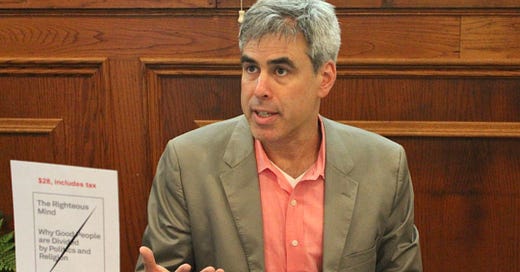Scholars on How Political Conformity in Universities is Damaging Research
Political and ideological diversity are essential
In recent years, a growing number of prominent scholars have voiced great concern over the declining political and ideological diversity in higher education. The intellectual cost of ideological conformity is steep. It threatens the quality, credibility, and integrity of research.
The alarm was sounded most famously by New York University psychology professor Jonathan Haidt in a 2011 talk to the Society for Personality and Social Psychology. Haidt argued that his field had become politically one-sided, breeding groupthink, confirmation biases, and silencing dissent.
In a 2014 paper co-authored with Philip Tetlock of the University of Pennsylvania and Lee Jussim of Rutgers University, Haidt argued that political diversity improves social psychological science. Their work detailed how dominant worldviews shape research questions, dictate what counts as valid evidence, and determine which findings are published or buried.
“Political diversity is likely to have a variety of positive effects by reducing the impact of confirmation bias and groupthink/majority consensus. Even research communities of highly intelligent and well-meaning individuals can fall prey to confirmation bias.”
— Haidt, Tetlolk, Jussim et al.
The problem extends beyond psychology. Nicholas Quinn Rosenkranz, a legal scholar at Georgetown University, wrote about a similar ideological imbalance in law schools. Graduate student Chris Martin documented it in sociology. These scholars, alongside Haidt, co-founded Heterodox Academy to promote viewpoint diversity in academia to foster a healthier climate of genuine debate. The goal isn’t ideological parity, but intellectual friction, the kind that pushes ideas to evolve under scrutiny.
“Modern universities do many things, but at their core they are truth-seeking institutions. Their central mission is to advance and disseminate knowledge. If universities are to perform that function, they need to be able to gather together a diverse range of scholars and students united by their willingness to question orthodoxies and pursue the truth.
Universities make it harder rather than easier to fulfill their core function of advancing knowledge if they nurture orthodoxies and exclude those who might be skeptical of those orthodoxies. Intellectual homogeneity too easily gives rise to intellectual complacency.”
— Keith E. Whittington, David Boies Professor of Law at Yale Law School
When dissenting views are unwelcome, research suffers. Contradictory evidence gets ignored, competing hypotheses are dismissed, important areas are not studied, and the line between research and political advocacy begins to blur. The consequences can be both academic and real-world.
Consider the case of Harvard economist Roland Fryer. A politically independent black professor, Fryer led a 2016 study on police use of force. His nuanced findings, showing no racial disparity in police shootings once contextual factors were accounted for, sparked outrage rather than debate. Though methodologically sound, Fryer's work was met with backlash, illustrating the professional risks of challenging prevailing narratives. His experience reveals how ideological conformity creates a chilling effect, discouraging scholars from following where the data leads.
The replication crisis in social psychology is another warning sign. For years, highly cited studies went unchallenged until replication efforts exposed deep methodological flaws. Many now argue that ideological uniformity played a role, allowing findings that aligned with preconceptions to go unquestioned, while skeptical voices were sidelined.
“The progress of any collective intellectual enterprise depends on the fair and vigorous competition of ideas. Scholars from different perspectives are needed to challenge one another so that findings, interpretations, and conclusions are honestly and rigorously tested; that different hypotheses are raised and considered; and that a wide range of interesting questions are asked and explored.
With liberal perspectives now prevailing in political science and across academia, that competition of perspectives has broken down. This is especially troubling when ideological implications are involved, as they often are.”
— James E. Campbell, Professor of Political Science at Stony Brook University
The costs are not merely theoretical. In the early 2010s, under pressure from Title IX and activist lobbying, many universities revised their procedures for handling sexual misconduct. Conservative and libertarian legal scholars warned that these changes trampled due process. Their critiques were ignored until court rulings declared many of these procedures unconstitutional. Had their perspectives been taken seriously earlier, universities might have avoided both legal setbacks and damaged reputations.
Similar dynamics have plagued economic policy. In Seattle, minimum wage increases were celebrated based on selectively positive studies. However, a more thorough analysis by University of Washington economists found that many low-wage workers lost hours, reducing their actual income. The political consensus around the policy had made honest critique difficult, even when backed by solid data.
In other sensitive areas, such as sex equity in STEM, similar problems arise. A 2015 study in Proceedings of the National Academy of Sciences found that women applying for STEM faculty positions were favored over men. The study, which challenged widespread assumptions, received intense pushback despite its methodological rigor. Once again, a finding that clashed with the dominant narrative was treated not with intellectual curiosity but with hostility.
Sally Satel, a psychiatrist at Yale Medical School, has explored academia’s blind spots. For decades, scholars largely framed authoritarianism as a right-wing phenomenon, rarely considering that it might also exist on the political left. However, 2020s studies from Emory University and the University of Montana showed that authoritarian behavior and attitudes, including dogmatism and censorship, exist across the political spectrum, and leftists can be as dogmatic as people on the right. Satel wrote that the possibility of leftist authoritarianism had previously been dismissed because of blind spots created by ideological groupthink.
When nearly everyone in a field shares the same assumptions, objectivity breaks down. Dissent becomes dangerous. Some hypotheses are considered settled dogma before they've even been tested. Others are treated as taboo or completely ignored.




